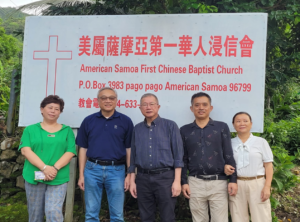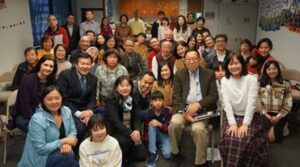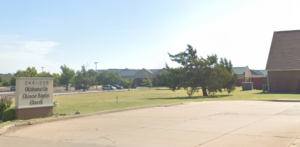The Hospital Chaplaincy
Rev. Henry Wong
I pastored a church for 16 years after seminary graduation in 1988, but resigned in the spring of 2004. I was burnt out and suffered from depression. I had no clue what I will do after being a pastor all my life. One day I had lunch with a friend who did an extended unit of Clinical Pastoral Education (CPE) with me back in 1998, without hesitation she suggested, “You need to do CPE!” She went even further to say that she would call the Director of the Clinical Pastoral Education Program (CPE) at the California Pacific Medical Center (CPMC) for me. CPMC was the hospital where I did my extended unit in 1998, I had such a bad experience that I vowed never to do CPE again.
My friend did talk to Dr. Kenny, the CPE Program Director, and he asked me to submit an application for the 2014-2015 CPE Residency. I was very late in applying and was rejected because they had chosen their residents already, but they will keep my application on file in case someone drops out and they needed a replacement. One late October afternoon Dr. Kenny called, “Are you ready for CPE?” I was not sure; I was scared! With no other ministry opportunities in the horizon, and not ready for another church, I “close my eyes” and stepped back into CPMC to be a Chaplain Resident in November of 2004. I ended up completing 2 years of CPE instead of the normal one year program.
CPE was exactly the medicine that a wounded soul like mine needed. I had “hit bottom” in my career and in my faith journey. I had nothing to lose, and was willing to try anything. In CPE, each intern honestly examines their own life story, and work with supervisors and colleagues on processing and reconciling experiences that have wounded them or negatively impacted their lives. I worked on mending my inner life. I worked on my relationship with God. I worked on my anger towards God. I worked on grieving my losses in life. I worked on healing and reconciling as a wounded minister. The healing work was accomplished with weekly journaling, reflection, supervision and covenant groups. Chaplains are wounded healers whom have suffered hurts themselves and have honestly sought healing themselves.
All my life, I have been slow to recognize the hand of God, but God loves me and was always there for me even when I felt He had abandoned me. As I looked back on my life, God showed up in the dark and lonely places time and again. It was the grace of God that saved me and sustained me. Many a time I stumbled onto God’s grace and His plan for me. I didn’t know that I could be a chaplain, but God intervened and I happened to stumble onto His grace again. There was never a clear calling that I wanted to be a chaplain. I might not be who I am and be a chaplain today had my friend not taken things into her own hands and called Dr. Kenny. It was Dr. Kenny who saw my gifts as a chaplain, and held me accountable to grow and develop during the CPE years. When I failed or doubted my own ability, Dr. Kenny would once again tell me that I have the gifts to be a good chaplain. Even so, but it was God who directed my story.
Here are suggestions for finding out more about becoming a chaplain:
1. Find out more about your spiritual gifts and your personality. Complete a spiritual gifts inventory to find out what your unique gifts are. Do you know your own personality? If not, take the Meyers-Brigg Type Test to see which of the sixteen types you are. Three Biblical passages talked about spiritual gifts: Romans 12:6-8, 1 Corinthians 12:8-10, and 1 Peter 4:11. Be careful with the 1 Corinthians passage because it really is focusing on gifts in the context of ministry in a church rather than the secular world. Therefore, having “gifts of healings, miracles, distinguishing between spirits” might not necessarily be “good” gifts to have as a chaplain. Mercy and service are two gifts often found among chaplains. Others will affirm your gifts if you seek honest advice, plus you will exercise your gifts effectively in your serving with satisfaction.
2. Seeking God’s will on your calling. First vital question is, “Do you feel called to serve others and/or serve God?” If your answer is “Yes”, then you can delve deeper into the nature and direction of your call. If you are interested in being a chaplain or doing pastoral care/counseling, ask those who know you well and love you “how do you see me as a minister to people who need help or in difficult situations?” People honest with you will give you a clear picture of who you are and what you need to do to continue the seeking process.
3. Find out more about the process of becoming a Professional Chaplain and the nature of their work.
a. Talk with chaplains in healthcare and civil settings about what they do. There are many kinds of chaplains, some are paid and others volunteer. There are healthcare chaplains, military chaplains, law enforcement and fire department chaplains, disaster relief chaplains, and so on. Find out what the similarities and differences among them are. For example, Dr. Rev. Lawrence Au, retired pastor of San Bruno Chinese Church, has been a San Francisco Police and FBI Chaplain for many years. He’s a good resource person to talk to for advice.
b. Visit a Clinical Pastoral Education (CPE) Center in the hospitals in your area to see what it is all about and how you feel about being a chaplain. You can find a list of accredited CPE Centers by visiting www.acpe.edu.
c. Volunteer in local hospitals or hospice to get firsthand experience caring for the sick and dying. Most hospices have a volunteer program that allow you to visit the dying patient and support family at home or in a facility. Other fine organizations in the San Francisco Bay Area with volunteering opportunities include the Herald Cancer Care (www.heraldcancercare.org) and the Heart of Hope Hospice (www.heartofhopehospice.org) in the San Francisco Bay Area.
d. Be a lay pastor in your church, visit the homebound and elderly members and seekers of your church.
e. Necessary and vital step. Enroll in a one year accredited CPE program to be trained as a chaplain. Many pastors and Christians think they have what it takes to be a chaplain because they assumed that they already have the gifts and skills needed, had received seminary training, ministered in the church and have it in their belief system. The truth is, many church pastors and Christians possess caring skills/techniques (what chaplains do) but not necessary a caring self (what a chaplain is to be). While CPE provides ample opportunities for one ministering to people in various illnesses and health crises, the most important part is to train your inner life as a chaplain. Chaplain work is “one life impacting another life” ministry, using one’s self, stories and experiences to walk with others in their pain and darkness. The important element in chaplaincy is to be “present” with those in suffering, not to sugar coat the present reality with words or activities. I like the term “soul friend” in describing a chaplain. CPE helped me to see myself honestly, and become aware of how my feelings, attitudes, biases, attitudes, beliefs and value systems colored me from seeing others as they are, and shielded me from being truly present to them. It is important that one learn to be patient-centered in patient care rather than chaplain-centered. It’s not “what I need to do or say” so I can feel successful with my visit; it’s “what they need” from me, even if I don’t have an answer for what they are going through. It is an incarnational ministry modelled after Jesus’ ministry, entering into the struggling soul of another person, and willing to walk with him through the valley of the shadow of death. On the practical side, many healthcare institutions are requiring 1 year of CPE as part of the qualification for their chaplain positions. Being trained in CPE also is a way for the chaplains to uphold their professional standards and qualifications.
4. Try it out.
Once you completed your CPE training, you are eligible to be employed as a chaplain in healthcare. You will learn more about the job and whether you truly are suitable for the work of a chaplain in the job.
The next step after employment is to seek ecclesiastical endorsement by the Southern Baptist Convention (SBC), or the denomination you are affiliated with. Denominational endorsement is one of many requirements leading to the Board Certification. SBC has many resources to support chaplains. There are many types of chaplains in the SBC. You can find information and resources at the NAMB website: www.namb.net/chaplaincy.
One should follow up denominational endorsement with board certification by a professional chaplain board. It is the “license” for professional chaplains, recognized by all healthcare institutions. The largest certification organization is run by the Association of Professional Chaplains (APC), there are other certifying organizations available, catering to different specialties, religious value and preferences.
My calling as a chaplain that began twelve years ago after I was done with the pastorate was affirmed during my training in CPE and in my work as a hospice chaplain up to now. I have been endorsed by the SBC and NAMB as their healthcare chaplain since 2009, and has been board certified by APC since 2011. Of course, equally rewarding is when patients, families and colleagues recognize me for the meaningful work that I do!
Postscript: One other important detail I need to point out about being a chaplain outside the church is, healthcare chaplaincy in North America is an interfaith ministry, which means chaplains provide spiritual care to all patients regardless of their religious affiliation. We don’t share our faith unless permission is given by patients and families. My take is that Jesus’ ministry was not exclusive but inclusive. He came for all, and His truth and grace is available to all. At the very least, people experience God’s compassion and support when they need it the most because we represent a God who is love.
(Rev. Henry Wong worships at the San Bruno Chinese Church in the San Francisco Bay Area, California.)
醫療院牧
1988 年神學院畢業後, 我在一間教會牧會了16 年, 但在 2004 年春天辭職了。 我感到疲憊不堪 , 患了抑鬱症。 我對前面的路很渺茫因為當了牧師一輩子的我不知還可做什麼。 有一天 , 我和一位朋友一起吃午飯, 在1998 年她和我一起參加了一個臨床牧關教育訓練課程(Clinical Pastoral Education 簡稱CPE), 她毫不猶豫地建議說 : “你需要再參加 CPE課程!”她甚至更進一步說她會打電話給 California Pacific Medical Center ( 簡稱CPMC) CPE 課程的主任。CPMC 是我在 1998 年參加這課程的醫院, 但在那裡有不開心的經歷。我發誓以後再不參加CPE 課程。
我的朋友與肯尼博士談過 , 他要求我提交一份 2014-2015 的 CPE 申請表。 我申請的時候很晚 , 因為他們已經額滿,我被拒絕了, 但是他們會把我的申請歸檔作候補名單。十月的一個下午, 肯尼博士電話說: “你準備好了嗎?”實際上我不確定,我甚至感到害怕! 但是似乎沒有其他機會, 我也沒有準備好去另一間教會事奉 , 於是我“閉上眼睛”, 回到 CPMC, 在 2004 年 十一月成為實習院牧。最後, 這常規一年時間的課程, 我花了兩年時間完成 。
CPE 正是我所需要的, 它是那種可以醫治受傷心靈的良藥。 當時我的事奉,信心,情緒都崩潰了。我沒有什麼可失去的 , 因此我願意嘗試任何東西。 在CPE 課程當中, 每個實習生都誠實地檢視自己的生命歷程, 並與導師和同事們一起處理和調和自己生命中的負面經歷。我努力修補我的內心生活,也努力修補與上帝的關係。 包括我曾經對上帝的憤怒並一直因生命的缺失而引致的悲傷。 作為一名院牧,我努力醫治和調和自己的情緒。 具體的醫治工作是完成每週日記 , 反思 , 監督和盟約小組治療。 院牧是受傷的療癒者, 他們遭受傷害, 並真誠地尋求醫治自已。
我一生都在慢慢地去認識神的帶領, 但神愛我, 即使我覺得祂已經拋棄了我,其實祂一直都與我同在。 當我回首我的生命, 上帝 一次又一次地出現,在我感到黑暗和孤獨的時候。 確實是神的恩典救了我 , 使我得以存活。 很多時候, 我偶然發現了上帝的恩典和祂對我生命的計劃。 我原先不知道我可以當院牧, 但上帝帶領我, 讓我再次謙卑俯伏在祂的恩典下。 我從來沒有一個明確的 呼召 , 想成為一個院牧。 我可能不會成為一個院牧,若我的朋友沒有打電話給肯尼博士,又要是肯尼博士看到我作為院牧的恩賜 , 並讓我在CPE 課程中成長和發展。 當我遭遇失敗,或者懷疑我自己能力的時候,肯尼博士會鼓勵我,說我有恩賜成為一名好的院牧。我的朋友和肯尼博士在我生命裏是重要的角色,但上帝是我生命的導演。
關於尋求如何成為一位院牧,我有一些的建議 :
1. 了解更多關於你的恩賜和個性。 你可以完成一個恩賜的清單, 找出什麼是你獨特的恩賜。 你知道你的個性嗎? 如果沒有 , 請採取 Meyers-Brigg 類型測試來查看你屬於的十六種類型中的哪一種 。 《 聖經 》中有三處提及屬靈的恩賜 : 羅馬書 12: 6-8, 歌林多前書 12: 8-10 和彼得(前)書 4:11 。 請留意到哥林多前書的經文 , 它特指在教會內部的屬靈恩賜,而不是外面世俗的 。 因此, 擁有 “醫病 , 行異能 , 辨別諸靈 ” 的恩賜 , 不一定是作為院牧的必要恩賜 。反而我們發現在院牧身上經常有仁慈和服侍他人這兩種恩賜 。如果你尋求誠實的建議 , 你身邊的人也會肯定你的恩賜, 而且當你有效地運行恩賜的時候,他人會喜悅你的服侍。
2. 在您尋求神呼召你的旨意中 , 第一個重要的問題是 “你覺得被呼召去服侍他人及/或服侍上帝嗎?” 如果對這問題的回答是肯定的 , 那麼你可以深入研究你的個性和呼召的方向 。 如果你有興趣成為一個院牧或教牧輔導的工作 , 諮詢那些認識並關心你的人。問他們: ” 你如何看待我作為一個院牧,來幫助有需要的或在困難中的人?“ 對你誠實的人會讓你清楚地了解你是誰,以及接下來你需要做些什麼 。
3. 尋覓更多關於成為專業院牧的過程及其工作的性質 。
a. 與專業院牧們傾談,了解他們在醫療保健和公眾塲合中的運作。 有些是受薪的 , 另一些是志願的。 事奉的範圍很廣寬, 例如醫療院牧 , 軍人院牧 , 執法和消防人員的院牧, 救災人員院牧等 , 找出它們之間的共同點和區別。 例如 , 活泉華人教會的退休牧師區穎寧牧師, 多年來一直是三藩市警察局和 FBI 的院牧。 區牧師可以為你提供很多的資源和建議。
b. 訪問在醫院的CPE中心, 了解CPE課程是什麼以及你對它的感受。透過www.acpe.edu 網站您可以找到三藩市灣區認可的 CPE 課程中心。
c. 去當地的醫院或參加安寧醫護中心 (Hospice) 工作來親身體驗和照顧病人和臨終的病人。 大多數的醫院及安寧醫護中心都容許志願者參加他們的工作 , 允許他們訪問垂死的病人和支持他們的家人。 在三藩市灣區有其他志願服務機會的優秀組織包括 Herald Cancer Care (www.heraldcancercare.org) 和 Heart of Hope Hospice ( www.heartofhopehospice.org) 。
d. 成為你教會中一個平信徒院牧, 探訪你教會的獨居長者。
e. 必要和重要步驟:就讀一年認證的 CPE 課程 , 作為院牧的培訓。 許多牧師和基督徒認為他們已有足夠的資格成為院牧 , 因為他們所受的神學訓練, 經歷, 恩賜都能給他們足夠能力事奉。 事實上, 許多教會牧師和基督徒都擁有關愛的技能和技巧(傳道人的工作), 但缺乏一個有愛心的自我 (傳道人的本身) 。 雖然 CPE 為在各種疾病和各種健康危機中的人提供了充足的資源 , 但最重要的是訓練你作為一個院牧的內在生命。 院牧的工作是 ” 一個生命影響另一個生命 ” , 利用自己的生命故事和經驗,與他人一起行走在他們的痛苦和黑暗中。 院牧的重要元素是與那些在痛苦中的人同行 , 和不帶糖外衣的實際言行。 我喜歡形容院牧是 “心靈的朋友 ” (Soul Friend) 這個名詞。 CPE 幫助我誠實地看待自己, 並意識到我的感受、態度、偏見、信仰和價值體系成為我看待他人的有色眼鏡 , 令我不能全人及全情投入去關懷照顧他人。 重要的是 , 你要學會以病人為中心 , 而不是以自已為中心 , 不是 ” 我需要做或說什麼 ” 。 成功的訪談 , 是關注 ” 他們所需要的 “, 即使對他們面對的問題我沒有解決方案 。 這是效仿耶穌的事奉 — 進入另一個在掙扎中的人之境界 , 並願意與他一起走過死蔭的幽谷。 實際上許多醫療機構要求 一 年的 CPE 培訓作院牧職位資格的一部分。 接受 CPE 培訓也是院牧提升專業資格的一種方式。
4. 試一試 。
一旦你完成了 CPE 培訓 , 你就有資格成為院牧。 你會了解更多 , 看看自己是否真的適合院牧的工作。
就業後的下一個步驟是尋求美南浸信會聯會 (Southern Baptist Convention簡稱SBC) 或你所屬宗派的認可。你宗派的認可非常重要。因為除非有他們的認可你不能得到院牧學會的認證書。 SBC 有很多資源支持院牧。他們也有許多類型的院牧。 您可以在美南國內傳道部 (North America Mission Board簡稱NAMB) 網站上找到信息和資源 : www.namb.net/chaplaincy .
得到你宗派的認可後, 你下一步就是得到你的專業院牧的認證書 (Board Certification)。 這是你的專業執照 (Licence) 被所有醫療機構承認的。The Association of Professional Chaplains (簡稱APC) 是院牧學會當中最大的。還有其他認證機構有不同類型的院牧發不同類型的專業院牧執照。
我作為一個教會的牧師 十二年後,被呼召成為院牧。 在完成 CPE 課程後, 我作為一個臨終關懷的院牧至今 。 自 2009 年以來 , 我是被SBC 和 NAMB 認可的 , 作為他們的醫療院牧 , 並在2011年被 APC 認證。 當然 , 得到病人 , 家人和同事認可的時候 , 我感到自己做的工作是非常有價值的!
另外、我需要指出一個重要的事情, 特別在教會外的院牧 : 在北美醫療系統, 院牧是一個跨越宗教的工作 , 這意味著無論病人的宗教信仰是什麼,院牧都需要提供病人屬靈上的關愛。除非病人和家屬同意 , 否則我們不能分享我們的信仰。我認為耶穌的事奉不是排他性的, 而是包容性的。耶穌來到世上是要為全人類, 祂的真理和恩典也是如此。 至少在人們最需要的時候, 能夠體會到上帝的憐憫和支持 。 因為我們代表的是仁愛的上帝。
(黃國軒牧師是三藩市灣區活泉華人教會的會友)






